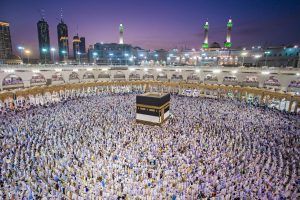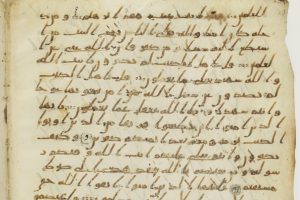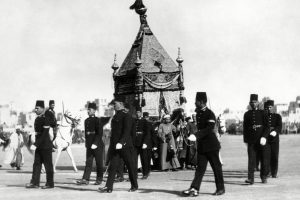
Another form of worship is Hajj—the Pilgrimage; which does not mean that a person should carry out the formality of the Pilgrimage by providing for his journey across the ocean with money lawfully or unlawfully acquired, and having repeated the prayers and formulas according to the directions of the servitors of the Ka’bah, should come back and boast that he has performed the Pilgrimage. The purpose that God Almighty has appointed for the Pilgrimage is not achieved in this manner. The truth is that the last stage of the seeker’s journey is that withdrawing himself altogether from the demands and desires of self, he should be completely engulfed by the love of God and complete devotion to Him. A true lover sacrifices his soul and heart; and the circuit of the House of Allah is a visible sign of such a sacrifice. As there is a House of Allah here below on the earth, so there is one in heaven. Until a person performs the circuit of the House above, his circuit of the House below is not truly performed. One who performs the circuit of the House below puts aside all garments, retaining only one of them to cover his body, but he who performs the circuit of the House above discards all garments altogether and becomes naked for the sake of God. The circuit is a sign of the lovers of God. They go round the Ka’bah as if they have no will of their own left and they are devoted wholly to Him.[1]
Allah desires to make all mankind as if they were all one person. This could also be called a democratic singularity. Under this concept the diverse mankind could be considered as one individual. The purpose of religion is also that the human race be united in the form of the beads of a Tasbeeh (rosary) through one thread.
The congregational prayers or Salat is also for such unification so that all the worshipers are counted as one. The reason why we are prescribed to stand shoulder to shoulder is so that who ever has greater wisdom or spiritual charisma is able to influence the weak. It is hoped that spiritual influence of the wise will diffuse into the weak. The Hajj is also for the same plan.
Allah started the plan of democratic singularity by instructing that all Muslims of a locality should say the five prayers in congregation in the local mosque; so that the moral qualities can be exchanged and the wisdom and light replaces weaknesses. By such interaction Muslims are introduced to each other and develop affection for each other. Such introduction is very important as that leads to affection which is the basis of the unification. […]
The second Divine instruction is that on Friday for the Friday prayer Muslims should gather in the main mosque of the township. It is hard for all the people of the town to get together on a daily basis. Therefore, it was suggested that all the citizens of a town should at least weekly get acquainted with each other and promote unity. By such a scheme, eventually, all of them will unite in one body or singularity. Then on an annual basis Allah has prescribed that the Eid prayers be said at a regional level so that acquaintance and affection grows wider and helps in the process of democratic singularity.
In the same theme, for the unity of the whole world, Allah has prescribed, to perform Hajj at least once in one’s lifetime so that representatives of all people assemble together in the expanse of Makkah. In summary, this is Allah’s desire that affection and love among mankind progresses.[2]
Endnotes
- Speeches to Jalsa Salana, 1906, pp. 20-21 (Eng. Translation: The Essence of Islam, Vol. 2, p. 317).
- Malfuzat, Hazrat Mirza Ghulam Ahmadas, Vol.4, p.100.




Add Comment